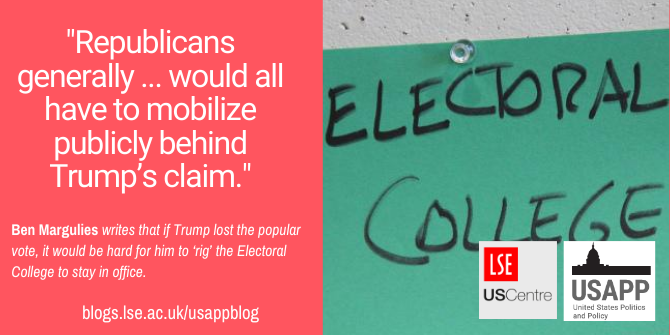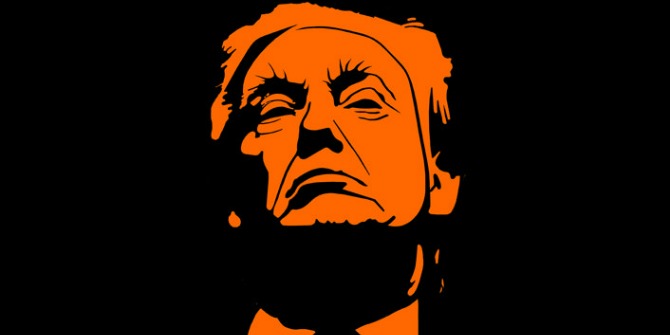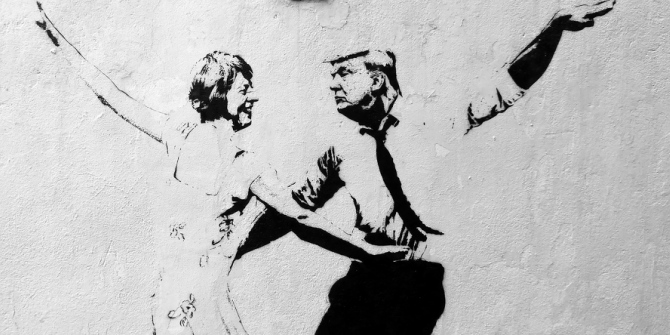 There has been some speculation on what Donald Trump might do if he lost the national popular vote but uncertainty remained around the results in some key states in the upcoming presidential election. Ben Margulies argues that Trump could try to circumvent the popular vote and rig the Electoral College in his favour, but it would be very difficult, and require broad cooperation from his party across both state and national levels.
There has been some speculation on what Donald Trump might do if he lost the national popular vote but uncertainty remained around the results in some key states in the upcoming presidential election. Ben Margulies argues that Trump could try to circumvent the popular vote and rig the Electoral College in his favour, but it would be very difficult, and require broad cooperation from his party across both state and national levels.
Like many populists, Donald Trump tends to reject the idea that “the people” might prefer another candidate. During the 2016 election campaign, he said he would accept election results “if I win.” In a recent interview with Fox News anchor Chris Wallace, Trump again refused to commit to accepting the results of an upcoming general election. “I have to see. Look, you — I have to see. No, I’m not going to just say ‘yes.’ I’m not going to say no and I didn’t last time either,” said Trump.
This has led some commentators and experts to describe what might happen should Trump dispute the election. Lawrence Douglas, a law professor at Amherst College in Massachusetts, sketched out one scenario for The Guardian. Douglas is releasing a short book of such scenarios, called Will He Go? Trump and the Election Meltdown of 2020. One of these involves an attempt by Republicans to use a chaotic election to seize control of the Electoral College delegations from certain states and win Trump a second term.
As many observers are now aware, US voters do not directly elect their president; each state chooses a slate of electors, which then meet in December to formally cast votes for the president. Article II of the Constitution states that electors are chosen “in such Manner as the Legislature thereof may direct.” Since the 1880 presidential election, all legislatures have “directed” that the popular vote should choose the state’s electors, usually on a winner-take-all basis (Maine and Nebraska currently use a slightly different system). However, it is possible for a legislature to appoint its own electors by passing state laws allowing for this. The scenario Douglas plots out is one where disputes over vote-counting or the validity of mail-in ballots lead Republican-controlled legislatures to do just this. In states with Democratic governors and/or secretaries of state (chief elections officers), this could mean that some states send two divergent Electoral College returns to Washington, leaving the matter for the newly elected Congress to settle in January.
This has happened before; the 1876 election featured competing sets of Electoral College returns, as white vigilante mobs terrorized African-American voters in the South. However, an attempt to hijack the Electoral College in this way would be very difficult, because the Republicans do not currently control the governorships of four key states: Michigan, North Carolina, Pennsylvania and Wisconsin. Nor is it a campaign Trump could carry out alone. Any attempt to circumvent or challenge popularly chosen electors would require broad support from the Republican Party, and the cooperation of key elected officials in multiple states. As Steven Levitsky, a political scientist at Harvard University, told Politico, “’No matter what the actual mechanisms are (which laws, which police), the key here is the Republican Party’”.
Why it may be difficult for Republican states to appoint Trump electors
Suppose Biden wins the popular vote in several swing states that have Republican legislatures. Given current polling, this might occur in the following states:
| State | Party controlling legislature | Party controlling governorship | Party controlling secretary of state's office | Legislature in session |
|---|---|---|---|---|
| Arizona | Republican | Republican | Democratic | No |
| Florida | Republican | Republican | Republican | No |
| Georgia | Republican | Republican | Republican | No |
| Iowa | Republican | Republican | Republican | No |
| Michigan | Republican | Democratic | Democratic | Yes |
| North Carolina | Republican | Democratic | Democratic | No |
| Ohio | Republican | Republican | Republican | Yes |
| Pennsylvania | Republican | Democratic | Democratic | Yes |
| Texas | Republican | Republican | Republican | No |
| Wisconsin | Republican | Democratic | Democratic | No |
The first actor in this scenario would be the Republican-majority legislature in any given state. It would have to agree to appoint a new list of electors. There is no guarantee that Republican legislators will do this, even if Trump demands that they do. Even if the Republican leaders in these bodies cooperate, a few defections by individual legislators might scuttle any bid to appoint Trump electors.
Where Republican legislatures face Democratic governors, the governors would veto any attempt by the legislature to amend state law and name Republican electors. In this case, Republican legislative majorities would have to try to name Republican electors anyway, on shaky legal ground. State legislatures do determine how each state chooses its electors, but they do so by enacting laws according to regular processes. This means the governor must sign them, or the Republican legislature must override the governor’s veto, usually by a supermajority. They do not have the necessary supermajority in the four states above where Republican legislatures face Democratic governors (Michigan, North Carolina, Pennsylvania and Wisconsin). Were Republican legislatures to simply appoint a set of electors anyway, the appointment would risk being annulled by the state’s own courts or rejected by Congress.
If Trump lost any three of these four states, he would lose the election. This fact alone means that it may be unlikely the Electoral College scenario will come to pass as Jason Harrow argues. However, Trump could win most or all of these four states but lose one or more of the other six states listed above where the governors are Republican. Then Republican governors and secretaries of state might become vital players, as well as Republican-majority state legislatures. Republican secretaries of state will need to affirm that the popular vote is somehow in doubt, to assert the election is “rigged.” Where the legislature is not in session, the Republican governor would have to call a special session so the legislature can change the electoral laws and name Republican electors, and then sign off on the amended laws. There is no guarantee these officials will cooperate, especially if they fear it will harm their chances for re-election.

“electoral college” by clemsonunivlibrary is licensed under CC BY NC 2.0
What happens if there is a dispute over who has won a state’s electoral votes? It is up to the newly elected Congress to count the Electoral College votes and declare the winner of the presidential and vice-presidential elections; it will meet to do this on January 6, 2021. The Electoral Count Act of 1887 sets out how Congress should handle disputes. Douglas’s fear is that, if the Republicans still have control of the Senate in January, that chamber will uphold Trump electors, and the Democratic House won’t, creating an insoluble deadlock.
The Electoral Count Act has a provision to deal with deadlocks, which would favour the slate certified by the state’s governor. This would tend to help the Democrats, since they control four key governorships. (Douglas may be arguing that Republicans will reject this procedure should it go against them.) But to produce a deadlock, Trump has to obtain the cooperation of Republican senators, and just a few defectors could derail his bid.
It all depends on the depth of the Republican Party’s support for Trump
This just details the procedural mechanics of overturning a Biden victory in the popular vote. Republicans generally – the Republican National Committee, media personalities, donors and activists – would all have to mobilize publicly behind Trump’s claim. Republican judges at the federal and state level might have to rule on claims of election malpractice and the legality of any competing returns. Should Democratic protests escalate, Republican governors and local officials will have to decide whether to assist the federal police Trump might send to restore order, as he has done in Portland.
On July 30, Trump suggested on Twitter that the election be postponed. That, too, would require Republicans to cooperate, because it would mean that Congress would have to amend the federal law which sets the election date. Since the Democrats control the House, that’s not actually possible at present. This means that Republican leaders could take a stand for or against postponement without much consequence, since it cannot legally happen. Nevertheless, the Republican leaders in the Senate (Mitch McConnell) and the House (Kevin McCarthy) have rejected pushing back polling day, as did the Republican Governor of Arkansas, Asa Hutchinson.
Donald Trump and his authoritarian instincts are dangerous. He remains the figurehead, the incarnation of a nationalist-populist movement, its motive force. However, it unlikely that the Electoral College offers him an alternative path of the presidency. Even if it does, it will be a path that will need to be hacked out by hundreds, or even thousands, of Republican officials and activists.
Please read our comments policy before commenting.
Note: This article gives the views of the author, and not the position of USAPP – American Politics and Policy, nor the London School of Economics.
Shortened URL for this post: https://bit.ly/3ft9KNQ
About the author
 Ben Margulies
Ben Margulies
Ben Margulies is a former lecturer at the University of Essex. Dr Margulies is also a fellow of the Royal Society of Arts.







There is no national popular vote. No one tries to win it. If there were a nationwide popular vote, where is the runoff election. Clinton in 2016 did not get even 50 percent of the votes cast nationwide, if you consider adding the votes together of 51 seperate elections with different stategies for each election a national popular vote. But we have no runoffs because there is no national popular vote. Runoff elections are also not without fairness issues. People who vote for minor candidates really get to vote twice in an instant runoff. A candidate thus with 49 percent of the number one votes can lose then to one with 20 percent of number ones, but 31percent of the number twos of another party leading to governing problems. In a election where citizens again vote for just the top two candidates, cabals form. Secret promises to minor candidates form because open bids for support leads to the loss of support from the party’s base. Then the 20 percent are secretly betrayed to the 31 percent. You could even get the John Quincy Adams, Andrew Jackson type election in every popular vote election additionally. That election in the U.S. was bitter enough with it going to the House. How about three parties at constant war after an election. Or are you ready for 30 parties because the electoral college gives us the stability of two major parties. And you do get to have more then two candidates for office. That is why there are primaries which control how liberal or conservative the power structure is with an array of candidates. Thanks for reading this. Debate makes us Americans.